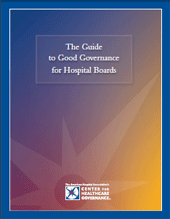
The Guide contains a comprehensive overview of the key components of good governance practices, as well as templates and tools to support these practices.
The resource materials found in the Guide are intended for use by all hospitals, non-profit, government or for-profit, however, they may need to be adapted to meet the needs of specific institutions. Hospitals are therefore encouraged to customize the tools and templates to meet their unique needs. It is not expected that hospitals will adopt the Guide in its entirety. Further, hospitals may wish to consult the Guide for different purposes. For example, new board members may utilize the Guide to familiarize themselves with governance practices and processes, while more experienced board members and officers may look to the Guide to supplement their practices in a particular area the Guide is not intended, nor should it be construed as legal advice. Hospitals concerned about the applicability of specific governance practices to their organization are advised to seek legal or professional advice based on their particular circumstances.
As hospitals continue to improve their governance processes and practices, additional resources will be needed. The Center looks forward to developing further tools, resources and educational programs that will supplement and expand upon the contents of the Guide.
About the Authors:
- Douglas K. Anning is Vice-Chair of the Nonprofit Organizations Practice Group for Polsinelli Shughart, PC in Kansas City, MO.
- Fredric J. Entin, Polsinelli Shughart, PC, Chicago, IL, offers clients extensive knowledge of health care corporate, regulatory and general counsel services to U.S. and international health care institutions, including academic medical centers.
- Mary K. Totten is President of Totten & Associates, a health care governance and leadership consulting firm based in Oak Park, Illinois.
Download Guide to Good Governance (Free)

